Jewish Students Are Bringing Their Faith to University Pro-Palestine Protests

Maen Hammad
Growing up in Israel, 23-year-old Aharon Dardik always loved Shabbat. It was a time of community, reflection, and prayer. So it was natural for him as an organizer, he says, to bring this Jewish tradition to the encampment for Palestinian liberation at his school, Columbia University in New York.
“Judaism has a history that goes back probably around 3,000 years, and Zionism [as a political ideology] has history that goes back around 200,” he tells Teen Vogue. “While I think the Jews have a historic connection to the land that's currently controlled by Israel, that does not necessarily mean that Zionism is part of the Jewish religion.”
For more than a week, students at Columbia and neighboring Barnard have occupied the main lawn in tents. They’ve been arrested, suspended, and evicted from university housing. They’ve braced for a visit from US House Speaker Mike Johnson, who said the Ivy League school ought to send the National Guard to campus. These protesters are demanding that the university divest from companies with economic ties to or investments in Israel, and grant amnesty to demonstrators who have been punished. Similar encampments have popped up at dozens of colleges across the US, and hundreds of students have been arrested, some in violent clashes with police.
Amid this backdrop, young Jewish people who oppose the war in Gaza are finding creative ways to use their faith to resist the violence arguably being waged in their name. Just last week Columbia students organized a ceasefire seder on campus for Passover, the Jewish holiday that celebrates the liberation of Jews from bondage in Egypt. Nearly 300 people were arrested at a similar demonstration outside Senator Chuck Schumer’s house in Brooklyn.
Jewish Voice for Peace (JVP), an anti-Zionist Jewish group, has been coordinating shabbat gatherings for months, including a national Shabbat for Ceasefire initiative in February. These student-led events have brought the fight for Palestinian liberation into this holy weekly ritual for the Jewish faith. Organizers who spoke to Teen Vogue hail from a spectrum of Jewish backgrounds and upbringings: the child of a rabbi; descendants of Holocaust survivors; queer Jews; Jews of color; immigrant Jews; religious and secular Jews.
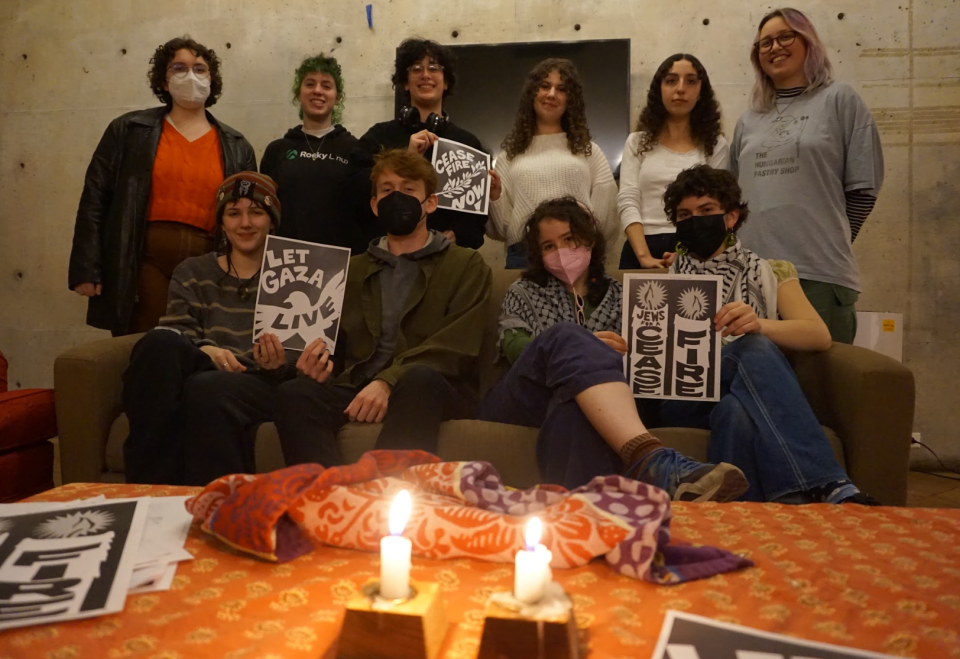
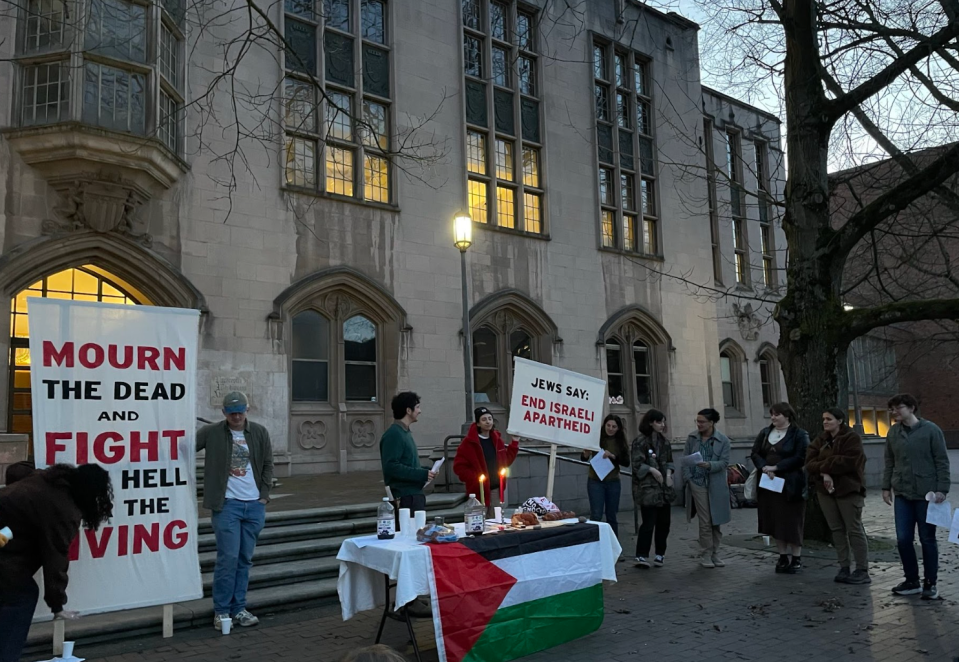
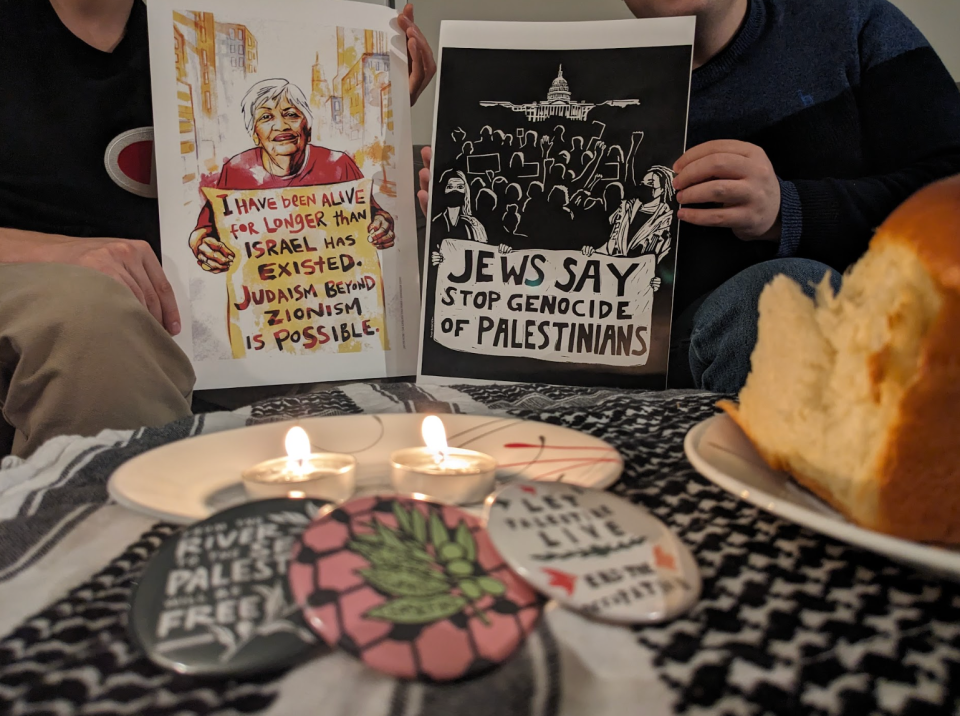
Jewish student protesters have taken pains to make sure their activism keeps the focus on Gaza, where, as of the writing of this article, more than 34,000 Palestinians have been killed and over 77,000 have been wounded, most of whom are women and children, according to the Gaza Ministry of Health. The assault on Gaza started after the October 7 attack on Israel, which left more than a thousand dead and hundreds more taken hostage by the militant group Hamas.
Jewish students leading Shabbat (also referred to as Shabbos) services have worked to merge Jewish traditions of the ritual with Jewish traditions of social justice. “It was a combination of the prayers and text linking the different aspects of the service to Palestine,” Katja Stroke-Adolph, 25, a law student and JVP organizer at the University of Chicago, tells Teen Vogue. “We talked about Palestinian steadfastness, or sumud, and how that inspires us in relation to Shabbos — thinking of it as a way of resting in order to sustain our energy, to then come back and keep working and keep fighting.”
On some campuses, services have included netilat yadayim, the washing of one’s hands before Shabbat and praying, which was performed while calling attention to the dearth of clean water being afforded to Palestinians. Others said the Mourner’s Kaddish, a prayer for those grieving the loss of a loved one, while reading off the names of those in their own campus communities who are grieving loved ones lost in the Gaza siege.
“To be Jewish in a time of genocide means that you have a duty and a responsibility to speak up,” says Bella Jacobs, a 22-year-old senior at Pitzer — and one of the organizers behind the recent, successful effort that made her college what appears to be the first in the US to cut its ties with an Israeli university due to the attacks on Gaza. “The second that we start deciding that ‘never again’ means only ‘never again’ for some people, I think that we've lost the teachings from people who have survived genocide.”
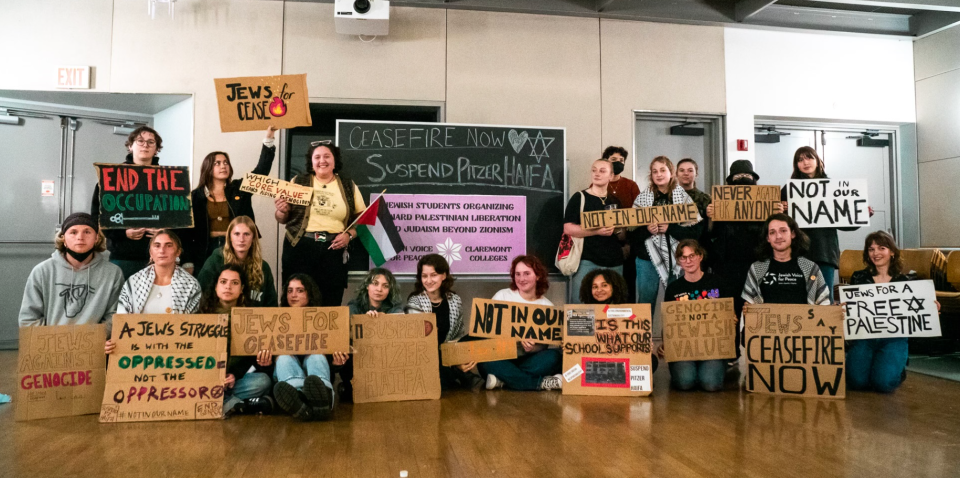
The students Teen Vogue spoke to for this piece report experiencing or witnessing harassment on their campus toward anti-Zionist activists, including those who are themselves Jewish. Emanuelle Sippy, 20, a Princeton University junior who led her school’s Shabbat for Ceasefire, tells Teen Vogue about an encounter she had while attending a pro-Palestine rally near her New Jersey campus. In a video from the October 28 event, a university staff member can be seen attempting to snatch Sippy’s phone, seemingly pulling some of her hair in the process, as the college paper The Daily Princetonian first reported.
In an email to The Daily Princetonian, a Princeton spokesperson wrote: “The University takes this matter seriously and has begun a review of the situation. We have reached out to a student involved to offer support and resources.”
The campus organization Sippy leads, Alliance for Jewish Progressives, has also been targeted by what has been dubbed a fleet of “doxxing trucks” sponsored by the Jewish Leadership Project. A Princeton University spokesperson declined to comment on these matters further for Teen Vogue.
Princeton is one of many campuses to see unrest stemming from these protests, and pro-Israel organizers, too, have experienced harassment. At Columbia University, for example, pro-Israel Jewish students were recently followed and yelled at to “go back to” Poland and Belarus, according to a report in the Columbia Spectator.
In a statement responding to those recent antisemitic incidents, Columbia University Apartheid Divest Coalition, the student group coalition behind the campus encampments, condemned any form of hate or bigotry and “stand[s] vigilant against non-students attempting to disrupt the solidarity being forged among students — Palestinian, Muslim, Arab, Jewish, Black, and pro-Palestinian classmates and colleagues who represent the full diversity of our country.”
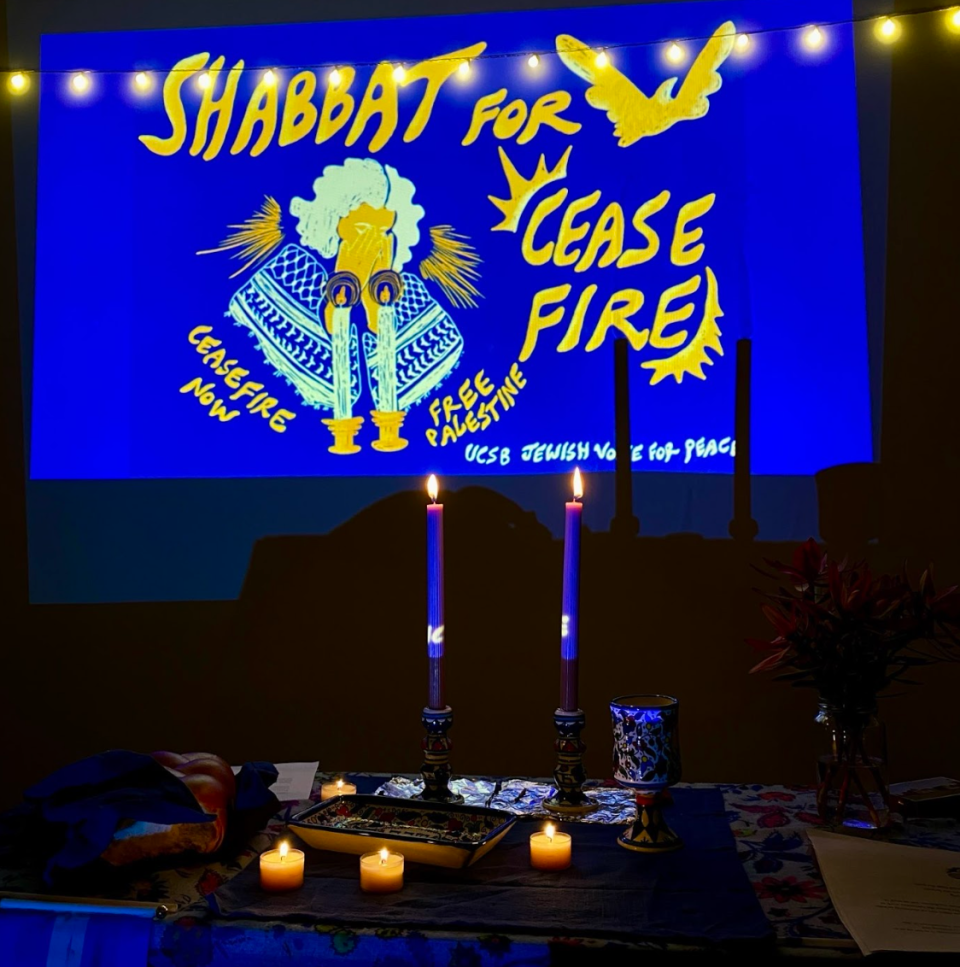
Shabbat for Ceasefire organizers like Sabrina Ellis, a junior at the University of Los Angeles, say they feel like they’ve found that solidarity with their fellow anti-Zionist Jewish peers. She and the other Jewish young people that spoke to Teen Vogue for this story say that, even in instances when there was no explicit hostility, anti-Zionist students feel alienated in mainstream Jewish spaces, which they say are mostly Zionist. “You can't agree to disagree on genocide,” Ellis says.
While Ellis and other students have long felt dejected and rejected in Jewish student spaces, they say events like Shabbat for Ceasefire help change that. “I didn't ever think I'd end up in a position where I'd be as connected as I am with the more religious practices of Judaism,” says Loy, 21, a senior at California's Scripps College who declines to give her last name due to concern over doxxing. Growing up as a more secular Jew, she’d been eager to deepen her practice when she joined various Jewish groups in college. But, she explains, “I didn't feel super comfortable in those spaces because there was such an explicitly Zionist bias.”
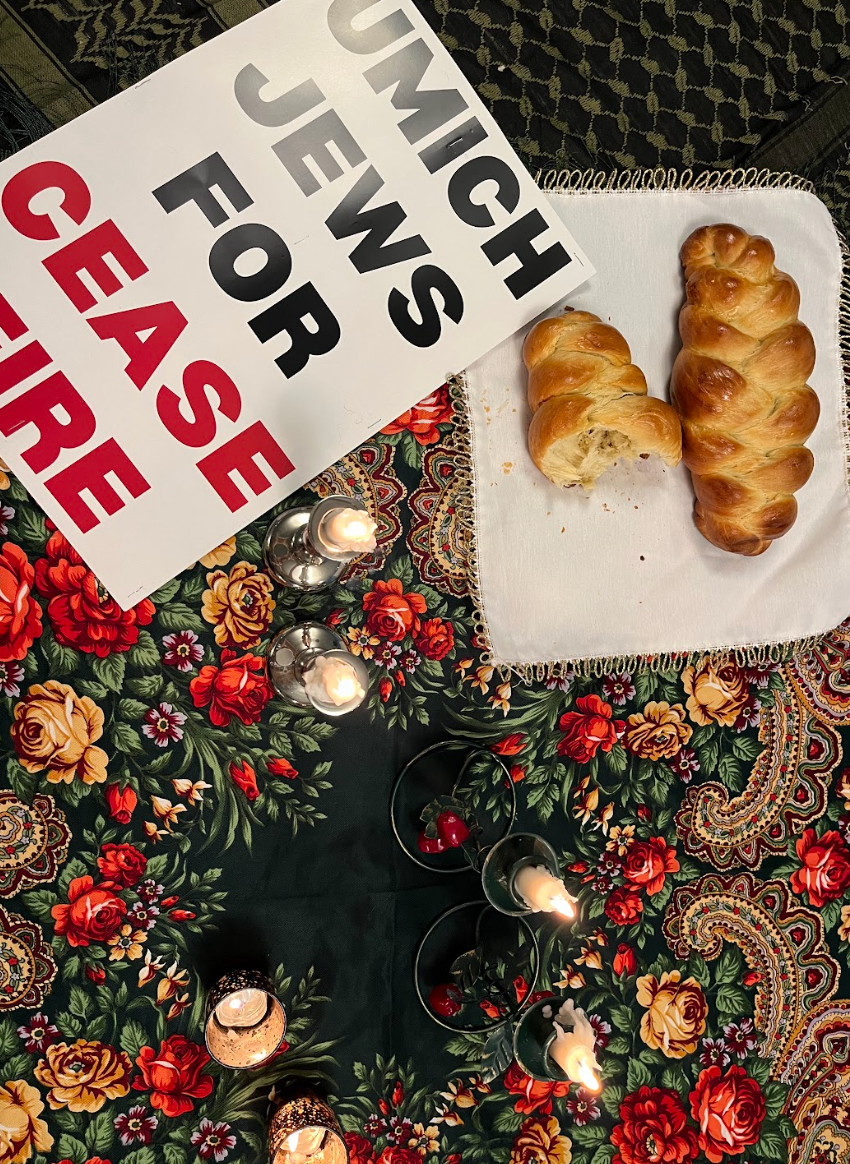
But at the Shabbat for Ceasefire, Loy says, she took the reins as a spiritual leader. “We took turns leading all of the prayers and songs. And I think it was really cool that I'm at a place now with my Judaism that I can sit in front of a room of people and feel confident leading those prayers.”
JVP organizer and University of Michigan sophomore, 19-year-old Annabel Bean, echoes these sentiments. For her, it was more than just making a statement on Jewish values; the Shabbat was a reclamation of her Jewish faith. “Since JVP has started at [the University of] Michigan, I've been the most religious I've ever been,” she tells Teen Vogue. “I've done more Shabbats in the past couple months than I have in my entire life.”
Stay up-to-date with the politics team. Sign up for the Teen Vogue Take
Originally Appeared on Teen Vogue
Want more faith and religion coverage from Teen Vogue?

